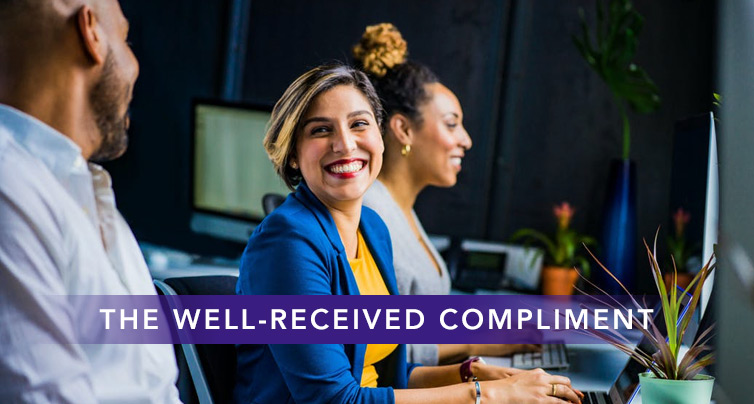Associates
Making The Most Of Compliments

Have you ever complimented someone and ended up wishing you hadn't? If so, it is probably because the receiver said something that created an awkward or conflicting moment for you. Would you, as the giver, be more likely or less likely to compliment that person after that? We each know the answer. Just as giving a compliment can serve as a source of empowerment, so can receiving a compliment. A compliment well received demonstrates social grace, diplomacy, even courage.
| One of two different approaches can be applied to receiving a compliment effectively: A closed-end response consists simply of the magic KISS (Keep It Short and Simple...unless it's a loved one or someone who can be kissed outside the workplace). The words "Thank you" or "I appreciate that" are effective closed-end responses. Eye contact and a smile, along with this basic approach, paints a warmly authentic picture of the receiver. Avoid the mistake of following such a brief response with controversial remarks (best for a separate conversation) or anything that puts yourself down or takes away from the compliment. |
TECH TIPUse the "Chat" feature in Microsoft Teams to compliment your co-workers and celebrate each other's successes. |
An open-end response is one that figuratively opens the door for more helpful feedback. In some ways, it does the giver of the compliment a favor by providing an opportunity to be more effective. The open-end response often takes the form of a question. For example, "Thanks. Can you tell me what I did, specifically, that you liked?" An open-end response in the form of a statement could be, "I've often wondered how you felt about my work in that area and I'd appreciate more detail." The receipt of this information can be followed up with "I appreciate your feedback." Or, "Okay, that's helpful to know and I'll keep it in mind."

If you change the way that you think about compliments, compliments can change you. Most adults were not sent to charm school. Many of us grew up as the children of parents who did not lavish us with compliments, so opportunities abound in adulthood to practice and grow from the skills of effectively giving and receiving compliments. Don't miss your chance. Try giving at least one effective compliment every day to a supervisee, a co-worker and even your supervisor. Since research has found that an altruistic compliment can affect chemical neurotransmitters in the brain, why not do yourself a favor and "rev up" these feel-good chemicals by dealing with compliments more often. You'll feel better, whether sending or receiving. And who doesn't want to feel good?
Debi Carter-Ford is a professor of psychology and consultant to management in the areas of applied psychology and employee training. Questions and comments may be sent to careers@dunsonandassociates.com.


Dunson & Associates, a Global Knowledge Authorized Training Partner, offers more than 3000 IT and Business courses! Click here to enter our learning portal, which allows you to view course outlines, schedule, manage and purchase training
© Copyright 2017 Dunson & Associates

